2017年北京高考英语试卷完整版.doc
2017年普通高等学校招生全国统一考试英语北京卷(附答案)

2017年普通高等学校全国招生统一考试(北京卷)英语本试卷共16页,共150分。
考试时长120分钟。
考生务必将答案答在答题卡上,在试卷上作答无效。
考试结束后,将本试卷和答题卡一并交回。
第一部分:听力理解(共三节,30分)第一节(共5小题;每小题1.5分,满分7.5分)听下面5段对话。
每段对话后有一道小题,从每题所给的A、B、C三个选项中选出最佳选项。
听完每段对话后,你都有10秒钟的时间来回答有关小题和阅读下一小题。
每段对话你将听一遍。
例:What is the man going to read?A.A newspaper. B.A magazine. C.A book.答案是A。
1.When will the film start?A.At 5:00. B.At 6:00. C.At 7:00.2.Which club will the man join?A.The film club. B.The travel club. C.The sports club.3.What was the weather like in the mountains yesterday?A.Sunny. B.Windy. C.Snowy.4.What does the man want to cut out of paper?A.A fish. B.A bird. C.A monkey.5.Where does the conversation most probably take place?A.In a library. B.At a bookstore. C.In a museum.第二节(共10小题;每小题1.5分,15分)听下面4段对话或独白。
每段对话或独白后有几道小题,从每题所给的A、B、C三个选项中选出最佳选项。
听每段对话或独白前,你将有5秒钟的时间阅读每小题。
听完后,每小题将给出5秒钟的作答时间。
2017年北京高考英语试卷及答案
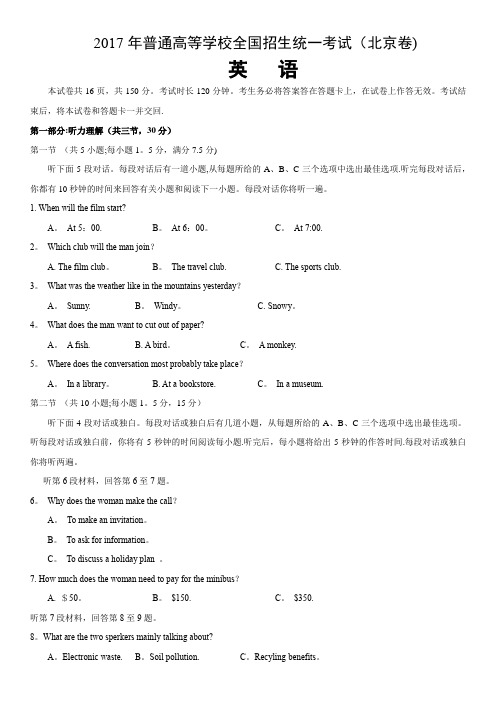
2017年普通高等学校全国招生统一考试(北京卷)英语本试卷共16页,共150分。
考试时长120分钟。
考生务必将答案答在答题卡上,在试卷上作答无效。
考试结束后,将本试卷和答题卡一并交回.第一部分:听力理解(共三节,30分)第一节(共5小题;每小题1。
5分,满分7.5分)听下面5段对话。
每段对话后有一道小题,从每题所给的A、B、C三个选项中选出最佳选项.听完每段对话后,你都有10秒钟的时间来回答有关小题和阅读下一小题。
每段对话你将听一遍。
1. When will the film start?A。
At 5:00. B。
At 6:00。
C。
At 7:00.2。
Which club will the man join?A. The film club。
B。
The travel club. C. The sports club.3。
What was the weather like in the mountains yesterday?A。
Sunny. B。
Windy。
C. Snowy。
4。
What does the man want to cut out of paper?A。
A fish. B. A bird。
C。
A monkey.5。
Where does the conversation most probably take place?A。
In a library。
B. At a bookstore. C。
In a museum.第二节(共10小题;每小题1。
5分,15分)听下面4段对话或独白。
每段对话或独白后有几道小题,从每题所给的A、B、C三个选项中选出最佳选项。
听每段对话或独白前,你将有5秒钟的时间阅读每小题.听完后,每小题将给出5秒钟的作答时间.每段对话或独白你将听两遍。
听第6段材料,回答第6至7题。
6。
Why does the woman make the call?A。
To make an invitation。
2017年北京高考英语试卷及答案

2017年普通高等学校全国招生统一考试(北京卷)英语本试卷共16页,共150分。
考试时长120分钟。
考生务必将答案答在答题卡上,在试卷上作答无效.考试结束后,将本试卷和答题卡一并交回.第一部分:听力理解(共三节,30分)第一节(共5小题;每小题1.5分,满分7。
5分)听下面5段对话。
每段对话后有一道小题,从每题所给的A、B、C三个选项中选出最佳选项。
听完每段对话后,你都有10秒钟的时间来回答有关小题和阅读下一小题。
每段对话你将听一遍。
1。
When will the film start?A。
At 5:00. B. At 6:00. C. At 7:00。
2。
Which club will the man join?A。
The film club. B. The travel club. C。
The sports club.3. What was the weather like in the mountains yesterday?A。
Sunny. B。
Windy。
C. Snowy.4. What does the man want to cut out of paper?A. A fish.B. A bird。
C. A monkey.5。
Where does the conversation most probably take place?A。
In a library。
B. At a bookstore。
C。
In a museum.第二节(共10小题;每小题1。
5分,15分)听下面4段对话或独白.每段对话或独白后有几道小题,从每题所给的A、B、C三个选项中选出最佳选项。
听每段对话或独白前,你将有5秒钟的时间阅读每小题。
听完后,每小题将给出5秒钟的作答时间。
每段对话或独白你将听两遍。
听第6段材料,回答第6至7题.6. Why does the woman make the call?A。
To make an invitation.B. To ask for information.C。
2017年北京高考英语试题及标准答案
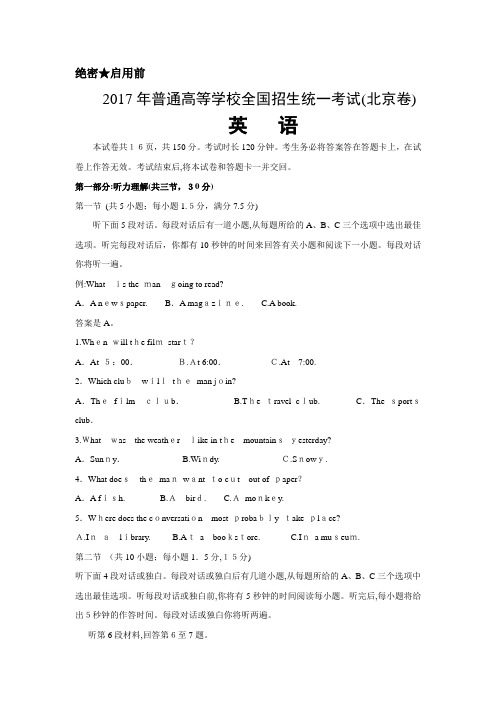
绝密★启用前2017年普通高等学校全国招生统一考试(北京卷)英语本试卷共16页,共150分。
考试时长120分钟。
考生务必将答案答在答题卡上,在试卷上作答无效。
考试结束后,将本试卷和答题卡一并交回。
第一部分:听力理解(共三节,30分)第一节(共5小题;每小题1.5分,满分7.5分)听下面5段对话。
每段对话后有一道小题,从每题所给的A、B、C三个选项中选出最佳选项。
听完每段对话后,你都有10秒钟的时间来回答有关小题和阅读下一小题。
每段对话你将听一遍。
例:Whatis the mangoing to read?A.A newspaper. B.A magazine. C.A book.答案是A。
1.When will the filmstart?A.At 5:00.B.At 6:00.C.At7:00.2.Which clubwilltheman join?A.Thefilmclub. B.The travel club. C.The sportsclub.3.Whatwas the weatherlike in the mountainsyesterday?A.Sunny. B.Windy.C.Snowy.4.What doesthemanwant to cut out of paper?A.A fish. B.Abird. C.Amonkey.5.Where does the conversation most probably take place?A.Inalibrary. B.Ata bookstore. C.In a museum.第二节(共10小题;每小题1.5分,15分)听下面4段对话或独白。
每段对话或独白后有几道小题,从每题所给的A、B、C三个选项中选出最佳选项。
听每段对话或独白前,你将有5秒钟的时间阅读每小题。
听完后,每小题将给出5秒钟的作答时间。
每段对话或独白你将听两遍。
听第6段材料,回答第6至7题。
2017年北京高考英语试卷及答案
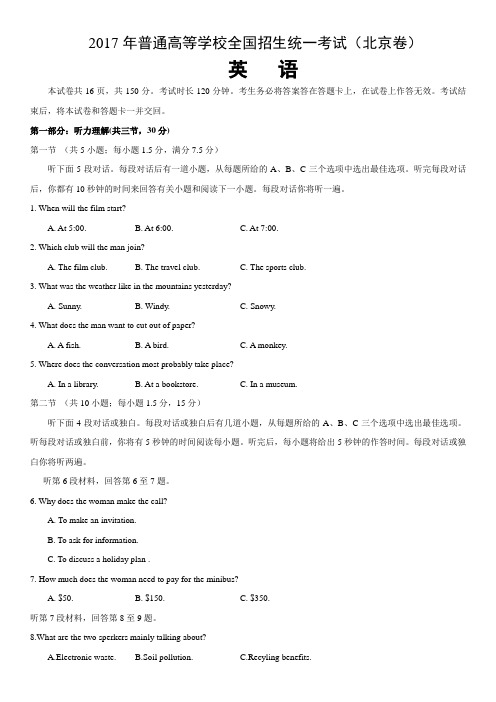
2017年普通高等学校全国招生统一考试(北京卷)英语本试卷共16页,共150分。
考试时长120分钟。
考生务必将答案答在答题卡上,在试卷上作答无效。
考试结束后,将本试卷和答题卡一并交回。
第一部分:听力理解(共三节,30分)第一节(共5小题;每小题1.5分,满分7.5分)听下面5段对话。
每段对话后有一道小题,从每题所给的A、B、C三个选项中选出最佳选项。
听完每段对话后,你都有10秒钟的时间来回答有关小题和阅读下一小题。
每段对话你将听一遍。
1. When will the film start?A. At 5:00.B. At 6:00.C. At 7:00.2. Which club will the man join?A. The film club.B. The travel club.C. The sports club.3. What was the weather like in the mountains yesterday?A. Sunny.B. Windy.C. Snowy.4. What does the man want to cut out of paper?A. A fish.B. A bird.C. A monkey.5. Where does the conversation most probably take place?A. In a library.B. At a bookstore.C. In a museum.第二节(共10小题;每小题1.5分,15分)听下面4段对话或独白。
每段对话或独白后有几道小题,从每题所给的A、B、C三个选项中选出最佳选项。
听每段对话或独白前,你将有5秒钟的时间阅读每小题。
听完后,每小题将给出5秒钟的作答时间。
每段对话或独白你将听两遍。
听第6段材料,回答第6至7题。
6. Why does the woman make the call?A. To make an invitation.B. To ask for information.C. To discuss a holiday plan .7. How much does the woman need to pay for the minibus?A. $50.B. $150.C. $350.听第7段材料,回答第8至9题。
2017年普通高等学校招生全国统一考试英语试题(北京卷,含解析)

绝密★启用前2017年普通高等学校全国招生统一考试(北京卷)英语本试卷共16页,共150分。
考试时长120分钟。
考生务必将答案答在答题卡上,在试卷上作答无效。
考试结束后,将本试卷和答题卡一并交回。
第一部分:听力理解(共三节,30分)第一节(共5小题;每小题1.5分,满分7.5分)听下面5段对话。
每段对话后有一道小题,从每题所给的A、B、C三个选项中选出最佳选项。
听完每段对话后,你都有10秒钟的时间来回答有关小题和阅读下一小题。
每段对话你将听一遍。
例:What is the man going to read?A.A newspaper. B.A magazine. C.A book.答案是A。
1.When will the film start?A.At 5:00. B.At 6:00. C.At 7:00.2.Which club will the man join?A.The film club. B.The travel club. C.The sports club.3.What was the weather like in the mountains yesterday?A.Sunny. B.Windy. C.Snowy.4.What does the man want to cut out of paper?A.A fish. B.A bird. C.A monkey.5.Where does the conversation most probably take place?A.In a library. B.At a bookstore. C.In a museum.第二节(共10小题;每小题1.5分,15分)听下面4段对话或独白。
每段对话或独白后有几道小题,从每题所给的A、B、C三个选项中选出最佳选项。
听每段对话或独白前,你将有5秒钟的时间阅读每小题。
听完后,每小题将给出5秒钟的作答时间。
2017年北京高考英语试题及答案word

2017年北京高考英语试题及答案word十年苦读一朝决胜负换来笑逐颜开;数载艰辛六月定乾坤赢得似锦前程。
祝高考成功!下面是店铺为大家推荐的2017年北京高考英语试题,仅供大家参考!2017年北京高考英语试题第Ⅰ卷(选择题,共115分)第一部分:听力理解(共两节,共30分)第一节(共5小题;每小题1.5分,共7.5分)听下面5段对话。
每段对话后有一道小题,从每题所给的A、B、C三个选项中选出最佳选项。
听完每段对话后,你将有10秒钟的时间来回答有关小题和阅读下一小题。
每段对话你将听一遍。
1.What is the man?A. A salesman.B. A teacher.C. A waiter.2. When did the woman see the man’s elder sister?A. YesterdayB. Two days agoC. Three days ago3. Where did the conversation probably take place?A. In an officeB. In a reading roomC. At home4. How often does the restaurant offer its dinner specials?A. Twice a dayB. Twice a weekC. Once a week5. What is the woman doing?A. Offering to helpB. Asking for permissionC. Asking for help第二节(共15小题;每小题1.5分,共22.5分)听下面6段对话或独白。
每段对话或独白后有几道小题,从每题所给的A、B 、C三个选项中选出最佳选项。
听每段对话或独白前,你将有5秒钟的时间阅读每小题。
听完后,每小题将给出5秒钟的作答时间。
每段对话或独白你将听两遍。
听第6段材料,回答第6至7题。
2017年北京高考英语试题及答案(精品资料).doc

【最新整理,下载后即可编辑】绝密★启用前2017年普通高等学校全国招生统一考试(北京卷)英语本试卷共16页,共150分。
考试时长120分钟。
考生务必将答案答在答题卡上,在试卷上作答无效。
考试结束后,将本试卷和答题卡一并交回。
第一部分:听力理解(共三节,30分)第一节(共5小题;每小题1.5分,满分7.5分)听下面5段对话。
每段对话后有一道小题,从每题所给的A、B、C三个选项中选出最佳选项。
听完每段对话后,你都有10秒钟的时间来回答有关小题和阅读下一小题。
每段对话你将听一遍。
例:What is the man going to read?A.A newspaper. B.A magazine. C.A book.答案是A。
1.When will the film start?A.At 5:00. B.At 6:00. C.At 7:00.2.Which club will the man join?A.The film club. B.The travel club. C.The sportsclub.3.What was the weather like in the mountains yesterday? A.Sunny. B.Windy. C.Snowy. 4.What does the man want to cut out of paper?A.A fish. B.A bird. C.A monkey.5.Where does the conversation most probably take place?A.In a library. B.At a bookstore. C.In a museum.第二节(共10小题;每小题1.5分,15分)听下面4段对话或独白。
每段对话或独白后有几道小题,从每题所给的A、B、C三个选项中选出最佳选项。
听每段对话或独白前,你将有5秒钟的时间阅读每小题。
2017年北京高考英语试卷及答案
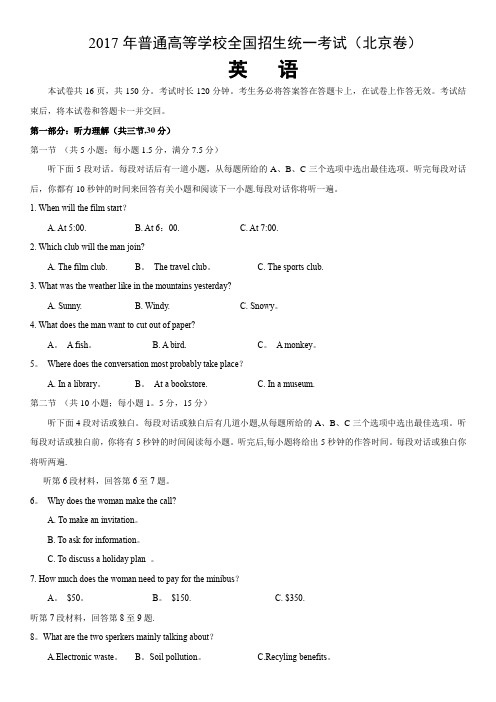
2017年普通高等学校全国招生统一考试(北京卷)英语本试卷共16页,共150分。
考试时长120分钟。
考生务必将答案答在答题卡上,在试卷上作答无效。
考试结束后,将本试卷和答题卡一并交回。
第一部分:听力理解(共三节,30分)第一节(共5小题;每小题1.5分,满分7.5分)听下面5段对话。
每段对话后有一道小题,从每题所给的A、B、C三个选项中选出最佳选项。
听完每段对话后,你都有10秒钟的时间来回答有关小题和阅读下一小题.每段对话你将听一遍。
1. When will the film start?A. At 5:00.B. At 6:00.C. At 7:00.2. Which club will the man join?A. The film club. B。
The travel club。
C. The sports club.3. What was the weather like in the mountains yesterday?A. Sunny.B. Windy.C. Snowy。
4. What does the man want to cut out of paper?A。
A fish。
B. A bird. C。
A monkey。
5。
Where does the conversation most probably take place?A. In a library。
B。
At a bookstore. C. In a museum.第二节(共10小题;每小题1。
5分,15分)听下面4段对话或独白。
每段对话或独白后有几道小题,从每题所给的A、B、C三个选项中选出最佳选项。
听每段对话或独白前,你将有5秒钟的时间阅读每小题。
听完后,每小题将给出5秒钟的作答时间。
每段对话或独白你将听两遍.听第6段材料,回答第6至7题。
6。
Why does the woman make the call?A. To make an invitation。
2017年北京英语高考真题(含答案)

2017年北京英语高考真题(含答案)绝密★启用前2017年普通高等学校全国招生统一考试(北京卷)英语本试卷共16页,共150分。
考试时长120分钟。
考生务必将答案答在答题卡上,在试卷上作答无效。
考试结束后,将本试卷和答题卡一并交回。
第一部分:听力理解(共三节,30分)第一节(共5小题;每小题1.5分,满分7.5分)听下面5段对话。
每段对话后有一道小题,从每题所给的A、B、C三个选项中选出最佳选项。
听完每段对话后,你都有10秒钟的时间来回答有关小题和阅读下一小题。
每段对话你将听一遍。
例:What is the man going to read?A.A newspaper. B.A magazine. C.A book.答案是A。
1.When will the film start?A.At 5:00. B.At 6:00. C.At 7:00. 2.Which club will the man join?A.The film club. B.The travel club. C.The sports club.3.What was the weather like in the mountains yesterday?A.Sunny. B.Windy. C.Snowy. 4.What does the man want to cut out of paper?A.A fish. B.A bird. C.A monkey. 5.Where does the conversation most probably take place?A.In a library. B.At a bookstore. C.In a museum.第二节(共10小题;每小题1.5分,15分)听下面4段对话或独白。
每段对话或独白后有几道小题,从每题所给的A、B、C三个选项中选出最佳选项。
听每段对话或独白前,你将有5秒钟的时间阅读每小题。
2017北京高考英语试题及答案
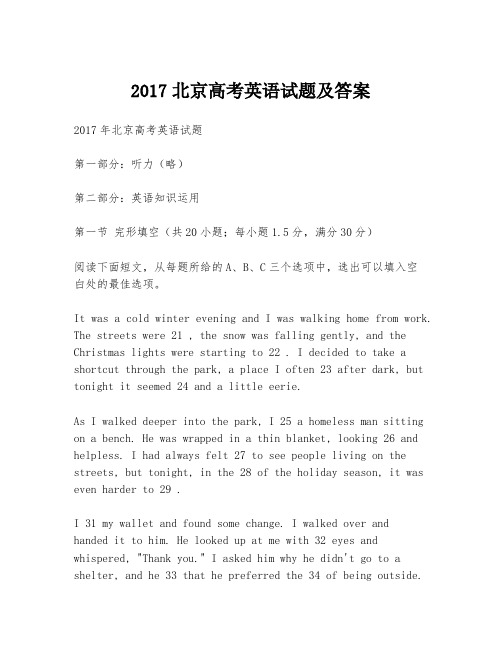
2017北京高考英语试题及答案2017年北京高考英语试题第一部分:听力(略)第二部分:英语知识运用第一节完形填空(共20小题;每小题1.5分,满分30分)阅读下面短文,从每题所给的A、B、C三个选项中,选出可以填入空白处的最佳选项。
It was a cold winter evening and I was walking home from work. The streets were 21 , the snow was falling gently, and the Christmas lights were starting to 22 . I decided to take a shortcut through the park, a place I often 23 after dark, but tonight it seemed 24 and a little eerie.As I walked deeper into the park, I 25 a homeless man sitting on a bench. He was wrapped in a thin blanket, looking 26 and helpless. I had always felt 27 to see people living on the streets, but tonight, in the 28 of the holiday season, it was even harder to 29 .I 31 my wallet and found some change. I walked over andhanded it to him. He looked up at me with 32 eyes and whispered, "Thank you." I asked him why he didn't go to a shelter, and he 33 that he preferred the 34 of being outside.I asked him if he was hungry, and he nodded.I decided to 35 him some food. I went to a nearby store and bought sandwiches and a hot 36 . When I returned, he was 37in the same spot, and I handed him the food. He 38 it gratefully and began to eat.We 39 for a while, and I learned that his name was John. He had been a 40 , but he had lost his job and his family had 41 him. He had been living on the streets for two years, and he had 42 all hope of ever getting back on his feet.I 43 him that things would get better, and I gave him my phone number, 44 he could reach out if he ever needed help. I45 him goodnight and continued on my way, feeling a sense of46 that I hadn't felt in a long time.That night, I 47 a lot about compassion and the 48 of helping others. It's easy to 49 people like John as just another statistic, but when you take the time to 50 their story, you realize that they are people with dreams and 51 , just like us.第二节语法填空(共10小题;每小题1.5分,满分15分)阅读下面材料,在空白处填入适当的内容(不多于3个单词)或括号内单词的正确形式。
2017年普通高等学校招生全国统一考试英语试题(北京卷,含解析)

2017年普通高等学校全国招生统一考试(北京卷)英语本试卷共16页,共150分。
考试时长120分钟。
考生务必将答案答在答题卡上,在试卷上作答无效。
考试结束后,将本试卷和答题卡一并交回。
第一部分:听力理解(共三节,30分)第一节(共5小题;每小题1.5分,满分7.5分)听下面5段对话。
每段对话后有一道小题,从每题所给的A、B、C三个选项中选出最佳选项。
听完每段对话后,你都有10秒钟的时间来回答有关小题和阅读下一小题。
每段对话你将听一遍。
例:What is the man going to read?A.A newspaper. B.A magazine. C.A book.答案是A。
1.When will the film start?A.At 5:00. B.At 6:00. C.At 7:00.2.Which club will the man join?A.The film club. B.The travel club. C.The sports club.3.What was the weather like in the mountains yesterday?A.Sunny. B.Windy. C.Snowy.4.What does the man want to cut out of paper?A.A fish. B.A bird. C.A monkey.5.Where does the conversation most probably take place?A.In a library. B.At a bookstore. C.In a museum.第二节(共10小题;每小题1.5分,15分)听下面4段对话或独白。
每段对话或独白后有几道小题,从每题所给的A、B、C三个选项中选出最佳选项。
听每段对话或独白前,你将有5秒钟的时间阅读每小题。
听完后,每小题将给出5秒钟的作答时间。
2017年北京市高考英语试卷(原卷版)

2017年北京市高考英语试卷本试卷共16页,共150分。
考试时长120分钟。
第一部分:听力理解(共三节,30分)第一节(共5小题;每小题1.5分,满分7.5分)听下面5段对话。
每段对话后有一道小题,从每题所给的A、B、C三个选项中选出最佳选项。
听完每段对话后,你都有10秒钟的时间来回答有关小题和阅读下一小题。
每段对话你将听一遍。
1. When will the film start?A. At 5:00.B. At 6:00.C. At 7:00.2. Which club will the man join?A. The film club.B. The travel club.C. The sports club.3. What was the weather like in the mountains yesterday?A. Sunny.B. Windy.C. Snowy.4. What does the man want to cut out of paper?A. A fish.B. A bird.C. A monkey.5. Where does the conversation most probably take place?A. In a library.B. At a bookstore.C. In a museum.第二节(共10小题;每小题1.5分,15分)听下面4段对话或独白。
每段对话或独白后有几道小题,从每题所给的A、B、C三个选项中选出最佳选项。
听每段对话或独白前,你将有5秒钟的时间阅读每小题。
听完后,每小题将给出5秒钟的作答时间。
每段对话或独白你将听两遍。
听第6段材料,回答第6至7题。
6. Why does the woman make the call?A. To make an invitation.B. To ask for information.C. To discuss a holiday plan .7. How much does the woman need to pay for the minibus?A. $50.B. $150.C. $350.听第7段材料,回答第8至9题。
2017年北京高考英语试卷与答案
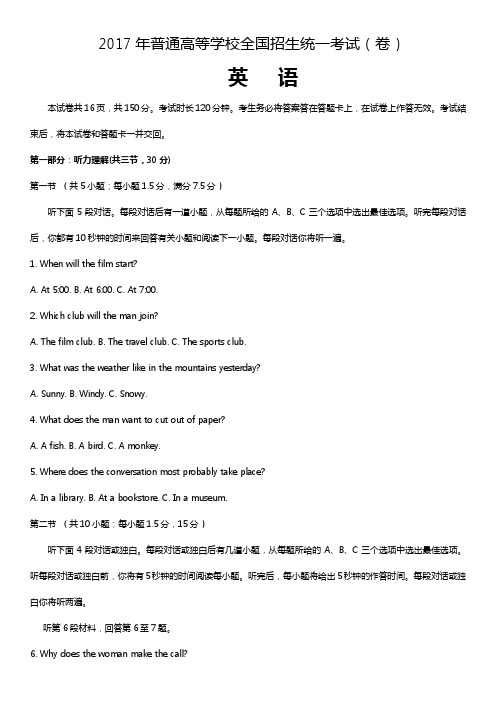
2017年普通高等学校全国招生统一考试(卷)英语本试卷共16页,共150分。
考试时长120分钟。
考生务必将答案答在答题卡上,在试卷上作答无效。
考试结束后,将本试卷和答题卡一并交回。
第一部分:听力理解(共三节,30分)第一节(共5小题;每小题1.5分,满分7.5分)听下面5段对话。
每段对话后有一道小题,从每题所给的A、B、C三个选项中选出最佳选项。
听完每段对话后,你都有10秒钟的时间来回答有关小题和阅读下一小题。
每段对话你将听一遍。
1. When will the film start?A. At 5:00.B. At 6:00.C. At 7:00.2. Which club will the man join?A. The film club.B. The travel club.C. The sports club.3. What was the weather like in the mountains yesterday?A. Sunny.B. Windy.C. Snowy.4. What does the man want to cut out of paper?A. A fish.B. A bird.C. A monkey.5. Where does the conversation most probably take place?A. In a library.B. At a bookstore.C. In a museum.第二节(共10小题;每小题1.5分,15分)听下面4段对话或独白。
每段对话或独白后有几道小题,从每题所给的A、B、C三个选项中选出最佳选项。
听每段对话或独白前,你将有5秒钟的时间阅读每小题。
听完后,每小题将给出5秒钟的作答时间。
每段对话或独白你将听两遍。
听第6段材料,回答第6至7题。
6. Why does the woman make the call?A. To make an invitation.B. To ask for information.C. To discuss a holiday plan .7. How much does the woman need to pay for the minibus?A. $50.B. $150.C. $350.听第7段材料,回答第8至9题。
- 1、下载文档前请自行甄别文档内容的完整性,平台不提供额外的编辑、内容补充、找答案等附加服务。
- 2、"仅部分预览"的文档,不可在线预览部分如存在完整性等问题,可反馈申请退款(可完整预览的文档不适用该条件!)。
- 3、如文档侵犯您的权益,请联系客服反馈,我们会尽快为您处理(人工客服工作时间:9:00-18:30)。
绝密★启用前2017年普通高等学校全国招生统一考试(北京卷)英语本试卷共16页,共150分。
考试时长120分钟。
考生务必将答案答在答题卡上,在试卷上作答无效。
考试结束后,将本试卷和答题卡一并交回。
第一部分:听力理解(共三节,30分)第一节(共5小题;每小题1.5分,满分7.5分)听下面5段对话。
每段对话后有一道小题,从每题所给的A、B、C三个选项中选出最佳选项。
听完每段对话后,你都有10秒钟的时间来回答有关小题和阅读下一小题。
每段对话你将听一遍。
1. When will the film start?A. At 5:00.B. At 6:00.C. At 7:00.2. Which club will the man join?A. The film club.B. The travel club.C. The sports club.3. What was the weather like in the mountains yesterday?A. Sunny.B. Windy.C. Snowy.4. What does the man want to cut out of paper?A. A fish.B. A bird.C. A monkey.5. Where does the conversation most probably take place?A. In a library.B. At a bookstore.C. In a museum.第二节(共10小题;每小题1.5分,15分)听下面4段对话或独白。
每段对话或独白后有几道小题,从每题所给的A、B、C三个选项中选出最佳选项。
听每段对话或独白前,你将有5秒钟的时间阅读每小题。
听完后,每小题将给出5秒钟的作答时间。
每段对话或独白你将听两遍。
听第6段材料,回答第6至7题。
6. Why does the woman make the call?A. To make an invitation.B. To ask for information.C. To discuss a holiday plan .7. How much does the woman need to pay for the minibus?A. $50.B. $150.C. $350.听第7段材料,回答第8至9题。
8.What are the two sperkers mainly talking about?A.Electronic waste.B.Soil pollution.C.Recyling benefits.9.What does the woman decide to do with her cell phone in the end?A.Throw it away.B.Keep it at home.C.Sell it to be recycled.听第8段材料,回答第10至12题。
10.What is the possible relationship between the two sperkers?A.Friends.B.Wife and husband.C.Business partners.11.Where does the woman work now?A.In a school.B.In a restaurant.C.In a travel agency.12.What are the two sperkers going to do?A.To take a trip.B.To have a coffee.C.To attend a meeting.听第9段材料,回答第13至15题。
13.What has been improved according to the speaker?A.The train station.B.The bus service.C.The parking lot.14.How does the speaker get to her office today?A.By bus and on foot.B.By train and by bus.C.By train and on foot.15. Who is the speaker?A. A reporter.B. A policeman.C. A photographer.第三节(共5小题;每小题1.5分,共7.5分)听下面一段对话,完成第16至20五道小题,每小题仅填写一个..词。
听对话前,你将有20秒钟的时间阅读试题,听完后你将有60秒钟的作答时间。
这段对话你将听两遍。
第二部分:知识运用(共两节,45 分)第一节单项填空(共15 小题;每小题1 分,共15 分)从每题所给的A、B、C、D 四个选项中,选出可以填入空白处的最佳选项,并在答题卡上将该项涂黑。
21. Samuel, the tallest boy in our class, ______ easily reach the books on the top shelf.A. mustB. shouldC. canD. need22. —Peter, please send us postcards ______ we’ll know where you have visited.—No problem.A. butB. orC. forD. so23. Every year, ______ makes the most beautiful kite will win a prize in the Kite Festival.A. whateverB. whoeverC. whomeverD. whichever24. —______ that company to see how they think of our product yesterday?—Yes. They are happy with it.A. Did you callB. Have you calledC. Will you callD. Were you calling25. ______ birds use their feathers for flight, some of their feathers are for other purposes.A. OnceB. IfC. AlthoughD. Because26. Jane moved aimlessly down the tree-lined street, not knowing ______she was heading.A. whyB. whereC. howD. when27. Many airlines now allow passengers to print their boarding passes online ______ their valuable time.A. saveB. savingC. to saveD. saved28. If you don’t understand something, you may research, study, and talk to other people _______ you figure it out.A. becauseB. thoughC. untilD. since29. In the 1950s in the USA, most families had just one phone at home, and wireless phones _______ yet.A. haven’t inventedB. haven’t been inventedC. hadn’t inventedD. hadn’t been invented30. The national park has a large collection of wildlife, _________ from butterflies to elephants.A. rangingB. rangeC. to rangeD. ranged31. The little problems ______ we meet in our daily lives may be inspirations for great inventions.A. thatB. asC. whereD. when32.Jim has retired, but he still remember the happy time _______ with his students.A. to spendB. spendC. spendingD. spent33.People______better access to health care than they used to, and they’re living longer as a result.A. will haveB. haveC. hadD. had had34. If the new safety system _______ to use, the accident would never have happened.A. had been putB. were putC. should be putD. would be put35. Many people who live along the coast make a living _______ fishing industry.A. atB. inC. onD. by第二节完形填空(共20 小题;每小题1.5 分,共30 分)阅读下面短文,掌握其大意,从每题所给的A、B、C、D 四个选项中,选出最佳选项,并在答题卡上将该项涂黑。
Hannah Taylor is a schoolgirl from Manitoba, Canada. One day, when she was five years old, she was walking with her mother in downtown Winnipeg. They saw a man 36 out of a garbage can. She asked her mother why he did that and her mother said that the man was homeless and hungry. Hannah was very 37 . She couldn't understand why some people had to live their lives without shelter or enough food. Hannah started to think about how she could 38 , but, of course, there is not a lot one five-year-old can do to solve (解决) the problem of homelessness.Later, when Hannah attended school, she saw another homeless person. It was a woman, 39 an old shopping trolley(购物车)which was piled with 40 . It seemed that everything the woman owned was in them. This made Hannah very sad, and even more 41 to do something. She had been talking to her mother about the lives of homeless people 42 they first saw the homeless man. Her mother told her that if she did something to change the problem that made her sad, she wouldn’t 43 as bad.Hannah began to speak out about the homelessness in Manitoba and then in other provinces. She hoped to 44 her message of hope and awareness. She started the Ladybug Foundation, an organization aiming at getting rid of homelessness. She began to __45__“Big Bosses” lunches, where she would try to persuade local business Leaders to 46 to the cause. She also organized a fundraising (募捐) drive in “Ladybug Jars” to collect everyone’s spare change during “Make Change” month. More recently, the foundation began another 47 called National Red Scarf Day --- a day when people donate $20 and wear red scarves in support of Canada’s 48 and homeless.There is an emergency shelter in Winnipeg called “Hannah’s Place”, something that Hannah is very49 of.H annah’s Place is divided into several areas, providing shelter for people when it is so cold that50 outdoors can mean death. In the more than five years since Hannah began her activities, she has received a lot of 51 .For example, she received the 2007 BRICK Award recognizing the 52 of young people to change the world. But 53 all this, Hannah still has the 54 life of a Winnipeg schoolgirl, except that she pays regular visits to homeless people.Hannah is one of many examples of young people who are making a 55 in the world. You can, too!36. A. jumping B. eating C. crying D. waving37. A. annoyed B. nervous C. ashamed D. upset38. A. behave B. manage C. help D. work39. A. pushing B. carrying C. buying D. holding40. A. goods B. bottles C. foods D. bags41. A. excited B. determined C. energetic D. grateful42. A. since B. unless C. although D. as43. A. sound B. get C. feel D. look44. A. exchange B. leave C. keep D. spread45. A. sell B. deliver C. host D. pack46. A. contribute B. lead C. apply D. agree47. A. campaign B. trip C. procedure D. trial48. A. elderly B. hungry C. lonely D. sick49. A. aware B. afraid C. proud D. sure50. A. going B. sleeping C. traveling D. playing51. A. praises B. invitations C. replies D. appointments52. A. needs B. interests C. dreams D. efforts53. A. for B. through C. besides D. along54. A. healthy B. public C. normal D. tough55. A. choice B. profit C. judgment D. difference三部分:阅读理解(共两节,40 分)第一节(共15 小题;每小题2 分,共30 分)阅读下列短文,从每题所给的A、B、C、D 四个选项中,选出最佳选项,并在答题卡上将该项涂黑。
